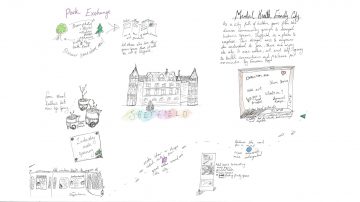It’s the week after the Election. Even for a short campaign the buildup has been strenuous. And just when we thought we’d reached the culmination of the drama, we haven’t. As stories go, this one is turning into an epic that has yet to finish unfolding.
During the week I was diverted from election speculation by a podcast about Robin Hood. Unsurprisingly the University of Nottingham has something of a specialism in this area, curating several versions of the story, from the earliest Old English through to the present day.
We were led on a fascinating tour through the various incarnations of Mr Hood, who, from relatively humble beginnings in the mists of history, graduated by the 1500s to a position of nobility with an impressive, almost certainly fictitious, family tree. I’m happy to report, though, that the Sheriff of Nottingham was an antihero from day one.
So the burning question: did Robin Hood steal from the rich and give to the poor? Well sort of, a bit. The ‘stealing from the rich’ bit seems fairly well established, but as for giving to the poor? He almost certainly did, but only once the needs of his merry band of men were well supplied.
I found the whole thing fascinating, but I’d like to suggest that none of this has much to do with whether or not the story of Robin Hood is true. I think that ‘Did it happen?’ and ‘Is it true?’ are questions which can have different answers.
Follow me in this brief diversion by way of illustration. Consider the story of the tortoise and the hare. For generations we’ve told this tale to our children because it contains an important truth: more haste, less speed. That’s a complicated concept for a four year old so we let the animals do the work. But suppose we encounter a particularly sceptical child:
“Really? Tortoises and hares talk to each other? In English? They set up some kind of cross-species Olympics?”
No, not really. These are the truly unimportant aspects of the story. They just help us along to the main point, the truth we’re trying to tell. Which has nothing to do with talking creatures setting up a long distance race.
So it is with Robin Hood. He’s the hero we love so much that we retell his story in writing, or more recently film, for every generation. He rampages through Sherwood Forest on a mission to redistribute wealth, outsmarting the Sheriff of Nottingham at every turn and spinning a ripping good yarn along the way. The truth in the story is our admiration for someone who takes risks to champion fairness, who takes things people are too rich to miss and gives them to those whose lives they can save. Over and over again.
In our hearts, don’t we all want to be Robin Hood? Who wants to be the Sheriff of Nottingham?
But there’s the rub, isn’t it? One of the Conservative candidates interviewed this week said that she felt her party’s campaign had failed to answer the question she kept being asked on the doorsteps: “What’s in it for me?” On the other hand, Labour ran under the slogan, “For the many, not the few”. So you see where I’m going with this? The battle between Robin and the Sheriff endures to this day, in our hearts. And that’s why it’s a true story.
On the other hand, the historical account does give a nice twist to the plot. Even our Robin turns out not to be quite so altruistic as we like to believe. And yet he has gone down in history for the good that he did do. Because, yes, he looked after his tribe, but he also did enough good to become famous for it. And that should give us hope.
Because heroes are beyond our reach; we can never match up. But we can all try to tip the balance of our lives in favour of kindness, generosity, and subverting the excesses of power. We turned an outlaw into a hero because he did just that.



